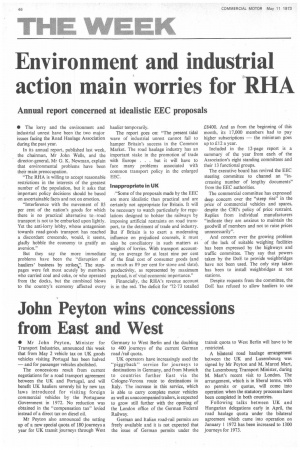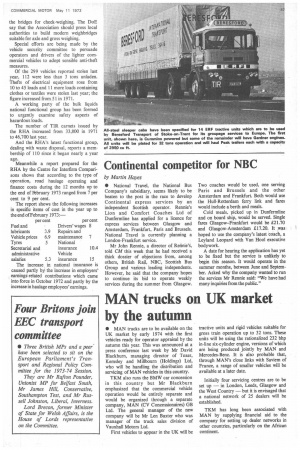Environment and industrial action main worries for RHA
Page 48

Page 49

If you've noticed an error in this article please click here to report it so we can fix it.
Annual report concerned at idealistic EEC proposals
• The lorry and the environment and industrial unrest have been the two major issues facing the Road Haulage Association during the past year.
In its annual report, published last week, the chairman, Mr John Wells, and the director-general, Mr G. K. Newman, explain that environmental problems have been their main preoccupation.
"The RHA is willing to accept reasonable restrictions in the interests of the greatest number of the population, but it asks that important policy decisions should be based on ascertainable facts and not on emotion.
"Interference with the movement of 85 per cent of the nation's goods for which there is no practical alternative to • road transport is not to be embarked upon lightly. Yet the anti-lorry lobby, whose antagonism towards road-goods transport has reached a discordant crescendo, would, it seems, gladly hobble the economy to gratify an aversion."
But they say the more immediate problems have been the "disruption of hauliers' business by strikes:. The stoppages were felt most acutely by members who carried coal and coke, or who operated from the docks, but the combined blows to the country's economy affected every haulier temporarily.
The report goes on: "The present tidal wave of industrial unrest cannot fail to hamper Britain's success in the Common Market. The road haulage industry has an important stake in the promotion of trade with Europe . . but it will have to face many problems associated with common transport policy in the enlarged EEC.
Inappropriate in UK
,"Some of the proposals made by the EEC are more idealistic than practical and are certainly not appropriate for Britain. It will be necessary to watch particularly for regulations designed to bolster the railways by imposing artificial restraints on road transport, to the detriment of trade and industry. But if Britain is to exert a moderating influence on prejudiced counsels, it must also be conciliatory in such matters as weights of lorries. With transport accounting on average for at least nine per cent of the final cost of consumer goods (and as much as 89 per cent for stone and slate). productivity, as represented by maximum payload, is of vital economic importance."
Financially, the RHA's revenue account is in the red. The deficit for '72-73 totalled £8400. And as from the beginning of this month, its 17,000 members had to pay higher subscriptions — the minimum goes up to £12 a year.
Included in the 12-page report is a summary of the year from each of the Association's eight standing committees and their 13 functional groups.
The executive board has revived the EEC steering committee to channel an "increasing number of lengthy documents" from the EEC authorities.
The commercial committee has expressed deep concern over the "steep rise" in the price of commercial vehicles and spares, despite the CBI's policy of price restraint. Replies from individual manufacturers "indicate they are anxious to maintain the goodwill of members and not to raise prices unnecessarily".
And concern over the growing problem of the lack of suitable weighing facilities has been expressed by the highways and traffic committee. They say that powers taken by the DoE to provide weighbridges have not been used. The only step taken has been to install weighbridges at test stations.
Despite requests from the committee, the DoE has refused to allow hauliers to use the bridges for check-weighing. The DoE say that the Association should press local authorities to build modern weighbridges suitable for axle and gross weighing.
Special efforts are being made by the vehicle security committee to persuade operators and drivers of the lighter commercial vehicles to adopt sensible anti-theft measures.
Of the 299 vehicles reported stolen last year, 112 were less than 3 tons unladen. Thefts of electrical equipment rose from 10 to 45 loads and 11 more loads containing clothes or textiles were stolen last year; the figure increased from 51 in 1971.
A working party of the bulk liquids national functional group has been formed to urgently examine safety aspects of hazardous loads.
The number of TIR carnets issued by the RHA increased from 33,800 in 1971 to 46,700 last year.
And the RHA's latest functional group, dealing with waste disposal, reports a membership of 110 since it began nearly a year ago.
Meanwhile a report prepared for the RHA by the Centre for Interffi-m Comparisons shows that according to the type of operation, road haulage operating and finance costs during the 12 months up to the end of February 1973 ranged from 7 per cent to 9 per cent.
The report shows the following increases in specific items of cost in the year up to the end of February 1973:—
per cent per cent Fuel and Drivers' wages 8 lubricants 3.9 Repairs and Vehicle prices 6.9 maintenance 7 Tyres 5 National Secretarial and insurance 10.4 administrative Vehicle salaries 5.3 insurance 15 The increase in national insurance is caused partly by the increase in employers' earnings-related contributions which came into force in October 1972 and partly by the increase in haulage employees' earnings.



























































































































































































































